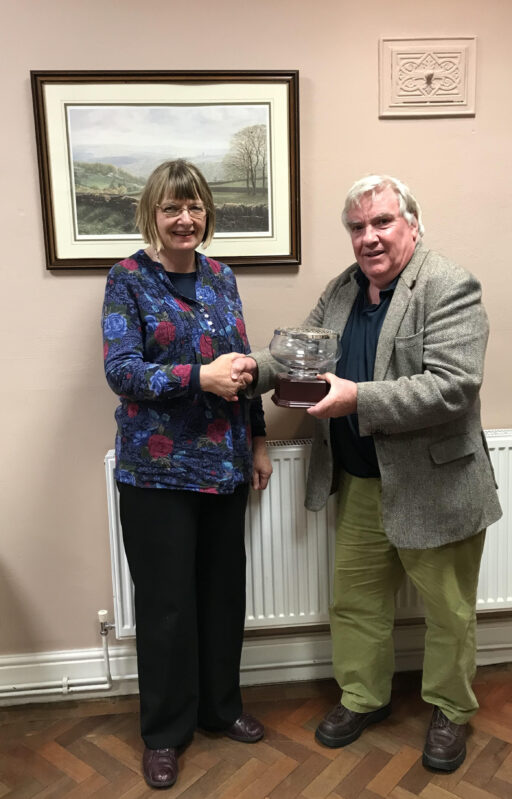
Tim Flanagan of the Stray Ferret, seen above presenting the Jack Moss rose bowl to Susan Perkins, did a very thorough job for us this year. Maggie Cobbett was in second place and Solvig Choi in third.
The theme of writing was widely interpreted by the different entrants with Tim’s comments précised as follows:
If It’s Not Written Down, It Never Happened: A well-constructed entry exploring the use of writing from both a professional and personal perspective. It draws on the writer’s experience of the perils attached to professional recordings when working in Children’s Social Services. It also gives their reflections on the recording of mundane events in family life and their belief that writing can be a powerful tool.
Some Writers and a Reader: This piece addresses why books get written and the way the reader reacts to them. A wide range of literature is considered in this well-researched and structured piece. Some of the books mentioned were read as a result of reviews in The Times or The Sunday Times, and Tim felt this writer would make a good book reviewer themselves.
Writing: What’s It For?: A beautifully-written piece supported by examples ranging from a Biblical text to a recipe for a Christmas pudding, all giving a different perspective on the purpose of writing. Tim decided that the skilful use of the supporting materials along with the blending in of personal anecdotes made this the winning entry.
Ideas Are Where You Find Them: Tim enjoyed this piece from a writer who admitted to being an unashamed eavesdropper, as from a journalist’s perspective a story often develops from something overheard. He enjoyed the concise and entertaining way in which the author described how they found and used their sources of inspiration.
He awarded it second place in the competition.
A Sprinkling of Latin: This piece explored the premise that the root of evil is greed, and takes the reader on an international journey that looks at bribery, freedom of the press and journalistic practices. It contains a mixture of references from the jailing of journalists to the tales of Chaucer and is well-constructed and thought-provoking. He awarded it third place in the competition.
Blood on the Typewriter: the reference to the typewriter took Tim back to his early days in journalism, and relates to an Ernest Hemingway quote about writing being easy. You just sit down at the typewriter and bleed. The piece is based on the author’s selection of eight books to take to a desert island and the function of writing in each of this broad-based collection.
Don’t Write Yourself Off!: a well-researched, informative and thought-provoking piece about writing being a living, breathing thing that is constantly expanding. It considers word selection and how a writer can retain the interest of their reader. Tim felt it was important to consider exactly who their reader was and agreed with the author how important it was that we all learnt from the writing of others.
Entries not read out during the evening will be given precedence at the meeting on 11th October, which will be for members’ manuscripts and a book sale.
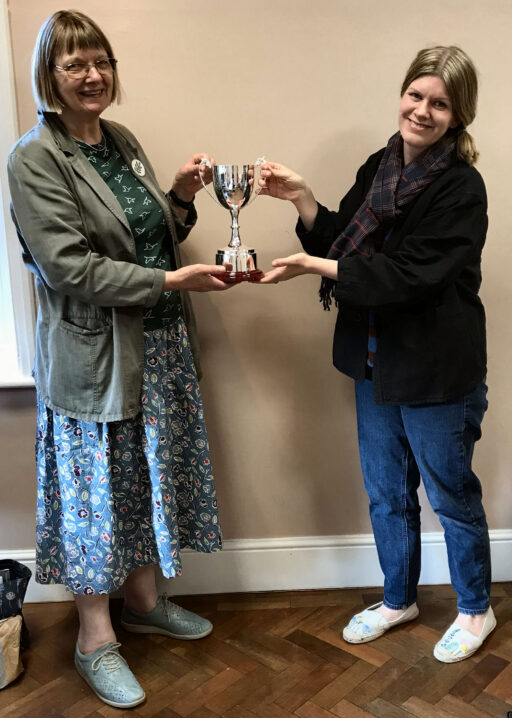
The inaugural competition in honour of former member Janet Barclay was adjudicated by her son Philip and won by Solvig. In the photograph above, our competitions secretary Susan is presenting the magnificent trophy donated by the Barclay family in loving memory of their mother.
Philip, who is currently working in Azerbaijan, emailed his remarks to us. He mentioned that it has been just over a year since his mother died and how much she had enjoyed being part of the group. She also really enjoyed comic writing herself, hence the genre chosen in her memory. Turning to the entries he wrote,
‘There were seven entries: 3 short stories – one of them quite like a play; two dramatic scenes, maybe veering towards screenplays for a comedy sketch, an essay and a poem. Most of the pieces had a timeless feel.’ After a brief reference to some recurring themes, he then went on to say, ‘The one thing they all had in common was that I read them all with pleasure’.
Maggie concluded her reading of the adjudication text by sharing Philip’s notes on each individual entry and announcing the results, which were as follows:
Joint 3rd ‘The Lemon Squeeze’ by Louise Joyce and ‘Welcome to my World’ by Susan Perkins.
2nd ‘Why? A Question of Power Tools’ by Carol Mayer.
1st ‘Fairness and Justice’ by Solvig Choi.
We are very grateful to Philip and look forward to maintaining contact with the Barclay family.
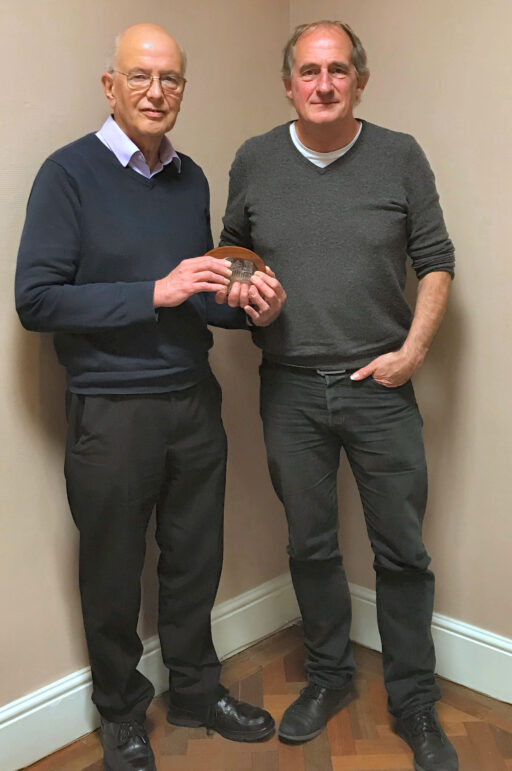
We were delighted to welcome writer, editor and poet Andy Croft to be our adjudicator this time round. Despite admitting that he doesn’t write short stories himself, Andy had obviously read a great many in the past and he treated us to a detailed analysis of the eight entries.
Secretary Peter Page received the trophy for ‘Inciting Incident’, a story of flirtation between a woman who thinks her husband is having an affair and a widower she meets on an Arvon playwriting course at The Hurst in Shropshire. (The title is a playwriting term.). Sheila Whitfield’s ‘Hat Tricks’, a story about a 57 year old loner who surprises himself by coming to the aid of a woman whose carrier bag fails in a supermarket car park, was in second place. The title refers to the fact that the protagonist often feels that he is wearing the wrong hat. Third was ‘Fisherman’s Tale’ by Denis Whitaker. A retired fisherman sitting on the harbour wall tells anyone who will listen about his possible encounters with a mermaid. The end of the story implies that the fisherman went to join the sea people after telling his tales for the last time.
After a break for refreshments, the three winners read their stories. Other entries will be given priority at our next Members’ Manuscripts meeting, which will also feature a book sale.
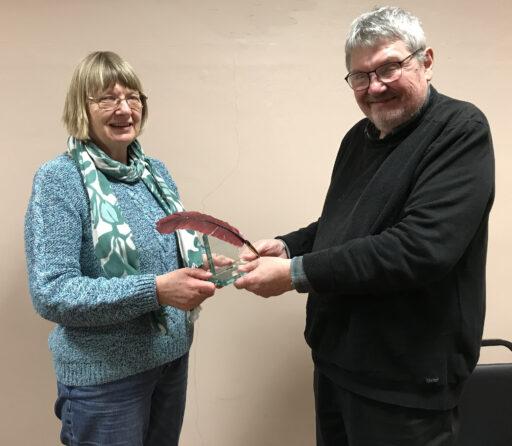
As a prelude to his adjudication, Paul spoke to us about his own wide-ranging writing, which includes two books on creative writing. He then went on to ask if writing poetry was different from other writing forms. Does it use a different part of the brain or is it so focused that it blots out other things? He said that writing poetry involves concentration, imagination and something which acts as a prompt. In addition he stressed the importance of reading other people’s work to sharpen one’s mind. A wide discussion of what makes a piece of writing a poem followed, touching on punctuation amongst other things.
When Paul turned to what he was looking for in a poem he emphasised that there were many different ways of writing one, but that the result should hold the reader’s attention – the reader should not feel that he is wasting his time. There are no hard and fast rules about form or subject or rhyme. However, the poem must mean something to the writer as well as to the reader.
Turning to the individual competition entries it was agreed to follow Paul’s suggestion that the writers should read their work before he gave his comments so that the comments meant something to the others present. The poems read were:
• Susan – ‘Going Downhill on a Bicycle’ – a poem supposed to have been written by a character from her recent novel
• Maggie – ‘The Last Amen’ – a lament for ‘the one who got away’
• Denis – ‘Dusk to Dawn’ – a poem inspired by a blind girl and looking at how senses can become sharpened
• Ros – ‘Living in Denial’ – a very personal poem about climate change
• Sheila – ‘The Enchantment of Birdsong’ – a poem inspired by hearing a song thrush while out walking
• Carol – ‘Not April but February Mr T S Eliot’ – a poem disputing the opening lines of Eliot’s ‘The Wasteland
• Peter – ‘The Naming of Books’ – a parody of ‘The Naming of Cats’ from ‘Old Possum’s Book of Practical Cats’
The authors of the remaining three entries were not present so their entries were held over.
Paul then proceeded to announce his choice of winners as follows:
• 1st – Susan Perkins with ‘Going Downhill on a Bicycle’
• 2nd – Ros Swaney with ‘Living in Denial’
• 3rd – Lindsay Trenholme with ‘The Power of Words’
Susan was presented with the trophy.
Maggie thanked Paul for his adjudication and invited him to read a selection of his own poems. These included ‘General Swim’ (about Ripon Spa Baths) and ‘Saturday Bells’ (about wedding bells at Ripon Cathedral) from his published collection ‘Voting for Spires’, both of which had also been published in the ‘Ripon Gazette’. He also read poems from his collection ‘Nomad’ and from a smaller collection inspired by a film.
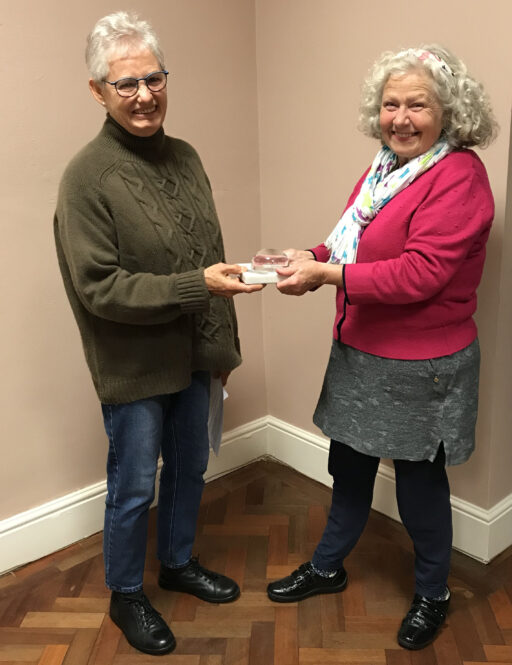
Ros Swaney receives the trophy from Linda Smith.
Maggie invited Linda Smith to present her adjudication of the 2021 Blast from the Past competition for a prose non-fiction piece on an historical subject. Linda began by saying that this was the first time she had been invited to do an adjudication like this. Speaking about her background in archaeology she said that she took part in her first dig in 1977, has a degree in Pre-History Archaeology from Sheffield and six years ago did a Master’s degree in Historical Archaeology at York. She has worked mainly in the north including the North York Moors National Park but has recently retired.
As well as writing as an academic, she uses journaling to help sort out ideas. During her working life, she developed a way of expressing in non-specialist terms what needs to happen and how it should be done so that an archaeological site is well managed both during excavation and afterwards. As an example she said that ecologists, farmers, architects are among those who need to understand the demands and constraints of an archaeological site.
Her criteria when adjudicating were:
• the reader should learn something from the piece
• it should hold a reader’s attention
• there should be evidence of relevant research
• there should be a strong sense of audience (who was it written for?)
• the structure should have a beginning, middle and end.
She went on to say that historical sources should be checked and referenced, that illustrations were helpful, and that personal pieces should bring out why they felt like history to the writer. A note of the word count and pagination were helpful to her as an adjudicator.
Before moving to comments on the individual entries, of which there were eight, Linda praised the very interesting spread of ideas.
Linda then announced the results as follows:
• Highly Commended – ‘From the ‘Lion King to Wimoweh’ and Beyond – The Story of a Song’ by Carol Mayer
• Third – ‘Talking the Blues’ by Sheila Whitfield
• Second – ‘The Railway Comes to Town’ by Peter Page
• First – ‘A Blast from the Past’ by Ros Swaney
Maggie invited Linda to present Ros with the trophy, after which a vote of thanks was proposed by Susan and endorsed by members in the usual way.
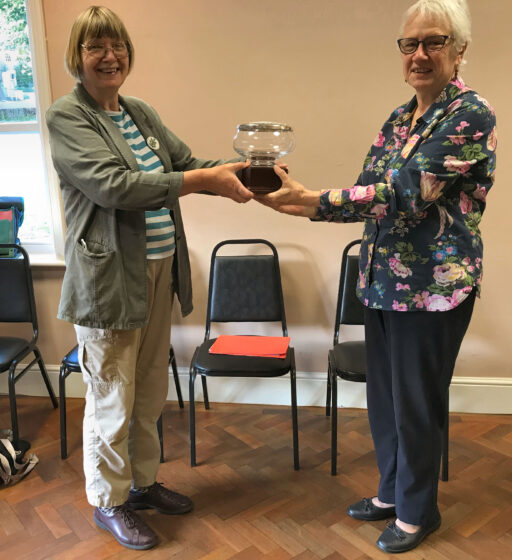
At our still socially distanced meeting last night, Competitions Secretary Susan was finally able to present Sheila with the trophy she won last autumn for the Article competition. Well done, Sheila!
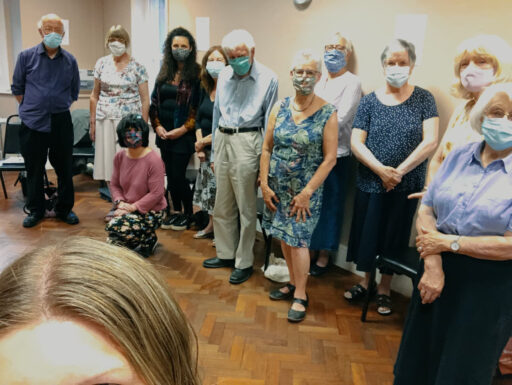
Not everyone was able to make the first face-t0-face (or rather mask-to-mask) meeting at our new venue, but we managed to do a lot of catching up on everyone’s news and to welcome our newest members, Miranda Hargrave and Solvig Choi. It is Solvig, almost in the photo above, that we have to thank for recording this unique moment in RWG’s long history.
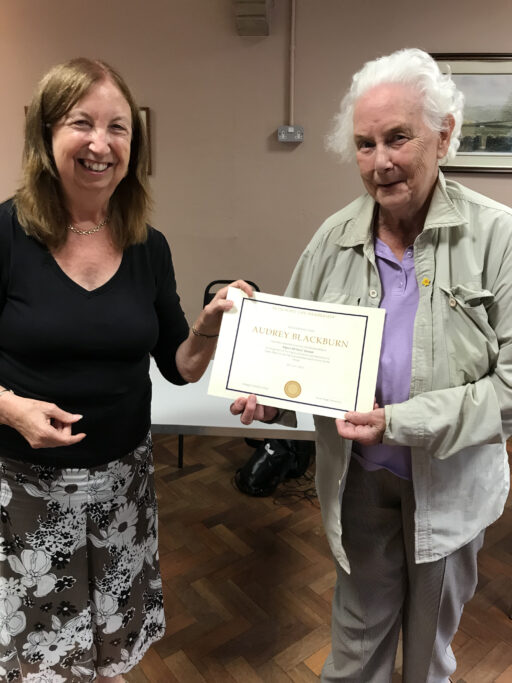
Audrey Blackburn was presented by our Chairman, Maggie Cobbett, with her honorary life membership and a similar certificate is on its way to Kathleen Atkinson who will, we hope, be able to join us at a later date.
Members who won trophies during lockdown were finally presented with them. These were:
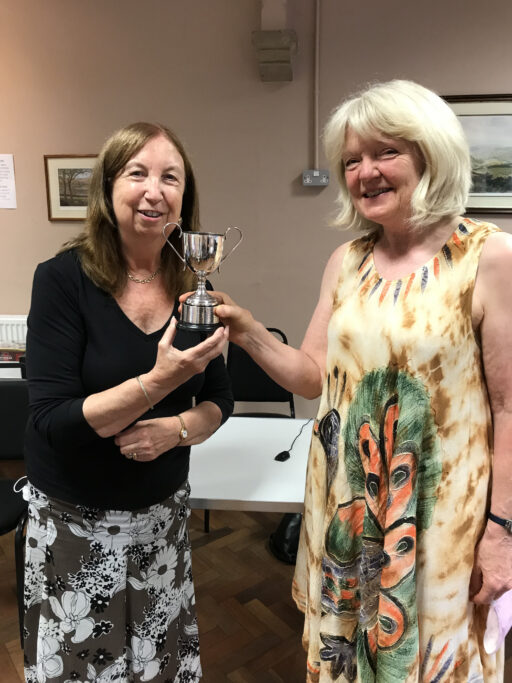
Lindsay Trenholme for the President’s Cup – presented by Maggie in the absence of Peter Hicks.
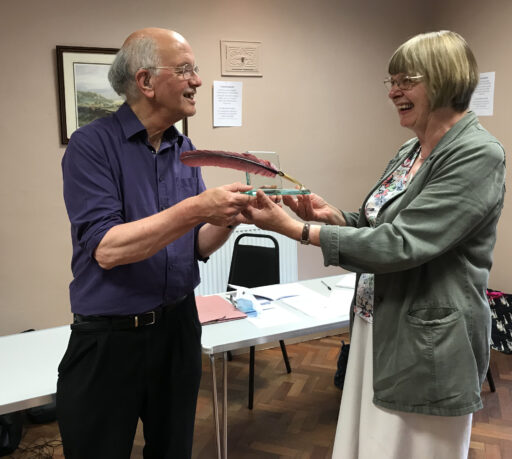
Peter Page for the Short Story competition – presented by our Competitions Secretary Susan Perkins.
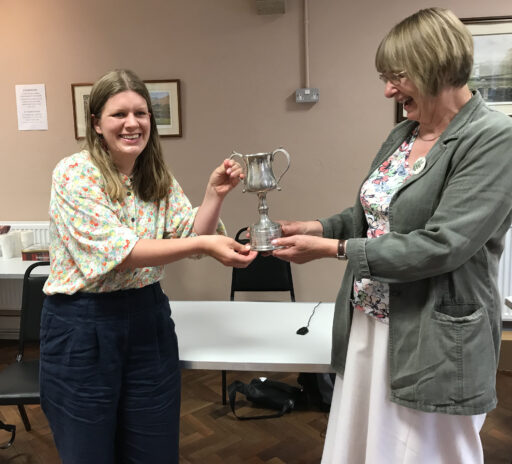
Solvig Choi for the Artistic Licence competition, the very first she had entered since joining RWG.
WELL DONE, ALL OF YOU!
In the time left over, a few members read out pieces they’d written recently and Christine treated us to a performance of her latest song.
« Newer Entries | Older Entries »












